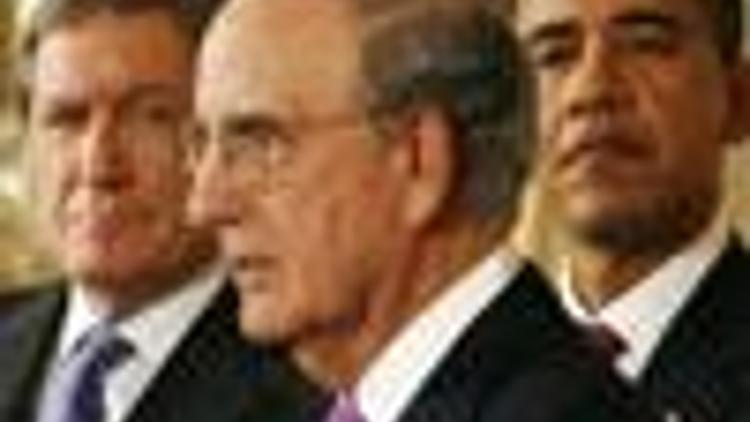Obama names peacemakers to hotspots in break with Bush policy
Güncelleme Tarihi:

U.S. President Barack Obama on Thursday picked two high-powered peacemakers for the Middle East as well as Afghanistan and Pakistan, in yet another swift break with Bush administration policy.
In an aggressive push for peace in the world’s most intractable hot spots, Obama named Northern Ireland mediator George Mitchell for the Middle East and Balkans broker Richard Holbrooke for both Afghanistan and Pakistan.
Flanked by the pair, Obama told U.S. diplomats that he and Secretary of State Hillary Clinton summoned the envoys to "convey our seriousness of purpose" in light of "the urgency and complexity of the challenges we face."
Clinton, who led the State Department ceremony that was also attended by Vice President Joe Biden, added: "Anything short of relentless diplomatic efforts will fail to produce a lasting, sustainable peace in either place."
The former US first lady said the State Department was "grateful" that Obama, on only his second day in office, was taking prompt action to deal with "two of the biggest foreign policy challenges of our time."
Obama’s choice of two such respected envoys signaled a new engagement in global affairs by his administration -- and another break with the policy of former president George W. Bush who resisted such a step.
The new president has also pledged to close the detention center at Guantanamo Bay, Cuba within a year.
However, there was little sign Obama would drop the Bush administrations hard line toward the Hamas Islamist movement when he backed Israel’s offensive in the Gaza Strip as a defensive move against Hamas rocket fire.
He called on Israel to open Gaza border crossings to aid and commerce to help ease the plight of Palestinians, but he made no mention of Jewish settlement building in the West Bank -- a sore point for the Palestinians.
Obama said he was sending Mitchell to the region as soon as possible to help shore up a fragile ceasefire that took hold last weekend after a three-week Israeli offensive left more than 1,330 Palestinians and 13 Israelis dead.
"It will be the policy of my administration to actively and aggressively seek a lasting peace between Israel and the Palestinians, as well as Israel and its Arab neighbors," Obama said.
Mitchell said he did not "underestimate the difficulty" of his assignment.
Mitchell, a Maronite Catholic whose mother was Lebanese, managed to bring together the leaders of Northern Ireland’s religious communities with a mixture of compromise and talks to sign the historic Good Friday agreement in 1998.
At the time Mitchell, a Democrat, was considered one of the only actors in the peace process enjoying the trust of all parties, earning a reputation in Belfast as a safe pair of hands and a shrewd, level-headed operator.
However, his efforts to help end the Israeli-Palestinian violence that erupted after the collapse in 2000 of the peace process brokered by president Bill Clinton proved fruitless.
Sallai Meridor, Israel’s ambassador in Washington welcomed Mitchell’s appointment.
"Israel holds Senator Mitchell in high regard and looks forward to working with him on taking the next steps toward realizing a future of peace and security for Israel and her neighbors," Meridor said in a statement.
EU foreign policy chief Javier Solana also welcomed the naming of Mitchell, saying in a statement that he "looks forward to working very closely with the U.S. Special Envoy Mitchell."
Holbrooke, the architect of the Dayton Accords which ended the Bosnian war, will take on responsibility for implementing an integrated strategy to U.S. policy towards Afghanistan and Pakistan.
He acknowledged that Afghanistan and Pakistan were two "distinct" countries entwined by history and ethnic ties. "This is a very difficult assignment as we all know," said Holbrooke.
Obama calls the war in Afghanistan, which also spills into Pakistan, as the "central front" in the war against terrorism, where the Taliban has come back from its ouster by the Bush administration in 2001 to wage a deadly insurgency.
He accused his predecessor of taking his "eye off the ball" by invading Iraq.
In taking charge of U.S. foreign policy, Clinton proclaimed a "new era for America" based on robust diplomacy, and an end to the intra-government divisions that "paralyzed" US decision-making under the Bush administration.

